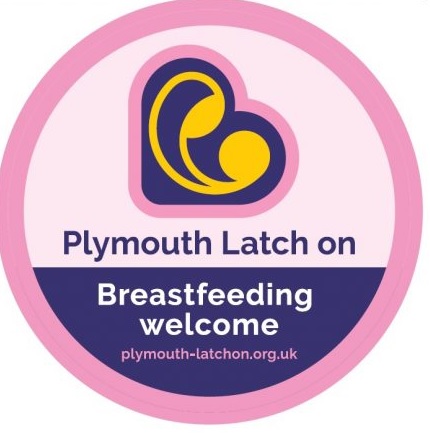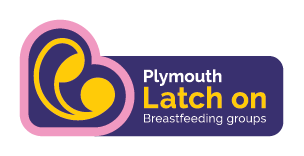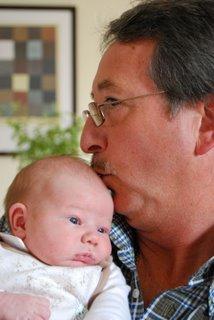 Congratulations You’re going to be a Grandparent!
Congratulations You’re going to be a Grandparent!
You have just become – or are going to be – a grandparent and your daughter /in law is keen to breastfeed. You have a wonderful opportunity to support her. You may have some concerns and questions about breastfeeding, this page can help.
Why is breastfeeding so important?
A mothers breast milk is unique to her own baby and is the only food a baby needs for the first 6 months. Breast milk is a “living fluid” which contains antibodies and other immune factors which help to keep a baby healthy and protect them from infection.
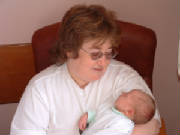 Benefits of breastfeeding:
Benefits of breastfeeding:
Breastmilk increases the baby’s resistance to infection and disease and the health benefits can continue into adult life.
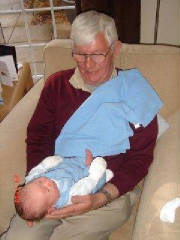 Benefits to baby:
Benefits to baby:
- Fewer visits to the doctor, and less admissions to hospital with gastro-enteritis.
- Reduces the risk of Sudden Infant Death Syndrome (cot death).
- Breast milk provides complete nutrition for a baby’s needs during the first 6 months of life – after this other foods can be gradually introduced and breastfeeding can continue for as long as the mother wishes.
- Breastfed babies suffer from less allergies, tummy upsets, asthma, eczema and ear infections.
- Less likely to develop diabetes, obesity and heart disease in later life.
- Breast milk is easily digested and makes baby less likely to suffer from constipation and colic.
- Formula milk is made from cows milk, which can be more difficult for a newborn baby to digest and can sometimes lead to constipation.
Benefits to mother:
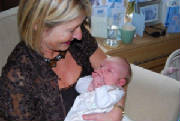 Breastfeeding lowers the risk of developing some types of cancer, and osteoporosis (brittle bones).
Breastfeeding lowers the risk of developing some types of cancer, and osteoporosis (brittle bones).- Helps a mother to get back in shape and lose the weight gained during pregnancy.
- Breastfeeding is free! It requires no special equipment or preparation.
Amazing milk!
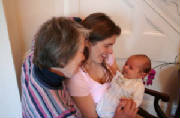 Breastmilk is easily digested, so breastfed babies need feeding whenever they show signs of hunger, or whenever mum wants or needs to feed.. This may be between 8-12 times in 24 hours in the first few weeks. All babies are individual and a mother’s body adjusts the amount of milk she makes so that the supply meets what her growing baby needs. Every time the baby feeds it stimulates the milk supply for the next feed.
Breastmilk is easily digested, so breastfed babies need feeding whenever they show signs of hunger, or whenever mum wants or needs to feed.. This may be between 8-12 times in 24 hours in the first few weeks. All babies are individual and a mother’s body adjusts the amount of milk she makes so that the supply meets what her growing baby needs. Every time the baby feeds it stimulates the milk supply for the next feed.
What about routines?
 In the first few months rigid feeding routines are not helpful to breastfeeding and can be the cause of many new mums giving up.
In the first few months rigid feeding routines are not helpful to breastfeeding and can be the cause of many new mums giving up.
Night time feeds are a very important part of establishing a good supply of breast milk, so we encourage mums to keep their babies with them all the time. Lots of cuddles help to stimulate milk production, and make babies feel secure. Babies cannot be “spoiled” with too many cuddles.
Babies can’t tell the time!
 A baby should be allowed to feed at the breast as soon as he or she is hungry – signs of hunger in a newborn baby include stirring, making sucking noises, licking his or her lips. Crying is the very last sign of hunger. A baby should feed until he or she comes off the breast himself, they know when they have had enough. Some babies need to feed from both breasts each feed, some don’t.
A baby should be allowed to feed at the breast as soon as he or she is hungry – signs of hunger in a newborn baby include stirring, making sucking noises, licking his or her lips. Crying is the very last sign of hunger. A baby should feed until he or she comes off the breast himself, they know when they have had enough. Some babies need to feed from both breasts each feed, some don’t.
How can I help?
 By choosing to breastfeed, your daughter/ in-law is giving your grandchild the best possible start in life. Following the birth of a baby, some new mothers feel emotional or overwhelmed by hormonal changes, they may also feel very tired.
By choosing to breastfeed, your daughter/ in-law is giving your grandchild the best possible start in life. Following the birth of a baby, some new mothers feel emotional or overwhelmed by hormonal changes, they may also feel very tired.
- Encourage her to have plenty of rest.
- She may appreciate help with housework, cooking, shopping or taking care of older children.
- Try and be sensitive to her feelings, the way you say something can be just as important as what you say.
- Offer her lots of encouragement and tell her how well she is doing.
- Encourage her to eat regularly and to have a balanced diet.
- Respect your daughter / in law’s feeding choices. Never feed your grandchild anything before checking with mum first.
- Try not to offer too much advice, sometimes simply listening can be the best help you can give.
- Reassure her that baby’s appetite may vary, for example during a growth spurt, often around 10-14 days and again at 6-8 weeks.
- Offer to go along with her to antenatal groups, Latch On groups, and read the leaflets.
- Remind her how well she is doing and that you are proud of her!
Can I give the baby a bottle so mum can rest?
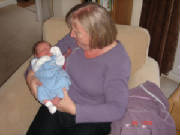 Not at first. Sucking on a bottle or dummy requires a very different action to breastfeeding and is not advised during the first few weeks as it may make breastfeeding more difficult. It can also lead to babies self soothing with the dummy and then missing feeds – less feeds = less milk made. Wait until breastfeeding is well established, usually about 4 – 6 weeks. Expressed breast milk can then be offered from a bottle or cup.
Not at first. Sucking on a bottle or dummy requires a very different action to breastfeeding and is not advised during the first few weeks as it may make breastfeeding more difficult. It can also lead to babies self soothing with the dummy and then missing feeds – less feeds = less milk made. Wait until breastfeeding is well established, usually about 4 – 6 weeks. Expressed breast milk can then be offered from a bottle or cup.
Offering to give the baby a bottle may seem helpful, but it can undermine a new mum’s confidence in her ability to breastfeed. It can also have a negative affect on her milk supply.
Does my grandchild need anything else?
Breast milk is all a baby needs for about the first 6 months of life. Even in hot weather there is no need to give extra drinks, baby will quench his or her thirst by having more frequent feeds.
What happens if Mum or baby are finding breastfeeding difficult?
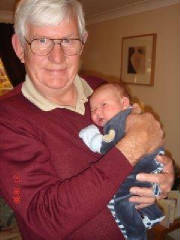 Breastfeeding is a skill, which a mother and baby need to practice. It is important that a baby is positioned and attached correctly at the breast. I
Breastfeeding is a skill, which a mother and baby need to practice. It is important that a baby is positioned and attached correctly at the breast. I
f your daughter / in law experiences pain, discomfort or difficulty with breastfeeding, encourage her to seek help and advice from her midwife, health visitor or local Latch On Breastfeeding group.
Plymouth has an extensive network of “Latch On” Breastfeeding support groups, which welcome all new parents/grandparents, their babies, and pregnant mums too.
Breastfeeding friendly
 We are working to make Plymouth a Breastfeeding friendly city and want Mums to feel comfortable to breastfeed anywhere. Some mums prefer more privacy than others when they breastfeed. Try to be sensitive to the individual needs of your daughter / in law.
We are working to make Plymouth a Breastfeeding friendly city and want Mums to feel comfortable to breastfeed anywhere. Some mums prefer more privacy than others when they breastfeed. Try to be sensitive to the individual needs of your daughter / in law.
We are working with Plymouth City council and local businesses to offer breastfeeding friendly venues across the City.
Look out for our breastfeeding welcome logo:
